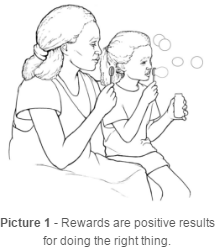Discipline
Primary Care Pediatrics
Looking for services or physicians who can help treat this condition?
![]()
A key role for parents and other caregivers is to provide discipline for children. Discipline teaches a child to follow a set of rules or expectations. Effective discipline starts at home, giving children a sense of order and routine. It will help them be more successful in meeting the expectations of the world around them.
Although “discipline” often refers to punishment to correct unwanted behaviors, it is often more effective to use positive strategies to increase wanted behaviors.
Rewards and Punishment

Rewards are positive consequences (results) that parents can give their children for doing something good like following family rules or doing what parents ask. Usually children want to please their parents and have their attention. Paying attention to only the negative behaviors may change how your child behaves. They may see this as a way to get attention, even if it is negative. Wanting attention can lead to your child misbehaving more often. When you reward wanted behavior, it encourages your child to repeat that behavior. Tell your child what you want them to do and reward them when they do it. Keep instructions simple and direct. Provide rewards as soon as possible. Instant rewards are best, especially for younger children (Picture 1).
Cost-free rewards include:
- praise
- a later bedtime for one night
- a trip to the park
- time playing a video game or watching television
Punishments are negative consequences for unwanted behaviors. A child is punished so the unwanted behavior is less likely to happen again. The purpose of punishment should never be to hurt or embarrass the child. Physical force (spanking, hitting or paddling) and/or humiliation (shame) are note types of punishment that should be used. Physical force and humiliation can teach a child those are the best ways to solve their problems. Some ways to punish without being physical include:
- Loss of privileges such as TV, video games, special activities.
- “Grounding" - child must stay home for a pre-set period of time.
- Fines or a decrease in allowance.
- Extra chores around the house.
- Have "time out” in a quiet, supervised place. The rule is one minute per year of age.
Steps to Effective Discipline
- Be clear about key rules at home. For example, no hitting/keep hands to yourself; do not leave the house without permission. Be consistent about carrying out these rules. If a behavior is important enough to make a rule, it must be important enough to result in a negative consequence when it is broken. This means you will likely have to limit the number of rules to stay consistent.
- Keep punishment length brief. For younger children, minutes or hours may be enough. For older children, punishments typically do not need to extend beyond that day.
- Do not give a big punishment for a small misbehavior. Only give punishments that you are willing AND able to follow through with.
- Most importantly, reward your child with praise or low/no-cost rewards when they follow the rules. Do not over-use punishment. Punishment is about unwanted behaviors occurring less. It is more efficient to use rewards to increase the behaviors you want.
Discipline: What to Do
- Take a deep breath and think before you discipline.
- Talk about your child's feelings and needs
- State the rule they broke and the consequence.
- Be consistent with your child.
- Take action and follow through with consequences.
- Praise your child when they do something right. Give your child a hug
- Be fair. Make the punishment fit the behavior.
- Be a good role model. Children learn from your actions.
- Calmly talk to your child ahead of time about rules and what will happen if they do or do not follow those rules.
Discipline: What Not to Do
- Do not react to your child from anger. Never hit or spank.
- Do not call your child names.
- Do not yell or scream. Be calm.
- Never criticize or blame your child.
- Never lecture or talk too much when you discipline your child
- Do not shame your child or compare them to another child.
If you have any questions, be sure to ask your child’s health care provider.
HH-IV-67 ©2011, Revised 2021, Nationwide Children’s Hospital
